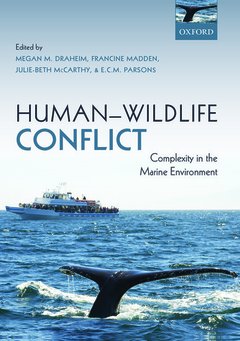Human-Wildlife Conflict Complexity in the Marine Environment
Langue : Anglais

Human-wildlife conflict (HWC) has classically been defined as a situation where wildlife impacts humans negatively (physically, economically, or psychologically), and where humans likewise negatively impact wildlife. However, there is growing consensus that the conflict between people about wildlife is as important as the conflict between people and wildlife. HWC not only affects the conservation of one species in a particular geographic area, but also impacts the willingness of an individual, a community, and wider society to support conservation programs in general. This book explores the complexity inherent in these situations, covering the theory, principles, and practical applications of HWC work, making it accessible and usable for conservation practitioners, as well as of interest to researchers more concerned with a theoretical approach to the subject. Through a series of case studies, the book's authors and editors tackle a wide variety of subjects relating to conflict, from the challenges of wicked problems and common pool resources, to the roles that storytelling and religion can play in conflict. Throughout the book, the authors work with a Conservation Conflict Transformation (CCT) approach, adapted from the peacebuilding field to address the reality of conservation today. The authors utilise one of CCT's key analytic components, the Levels of Conflict model, as a tool to provide insight into their case studies. Although the examples discussed are from the world of marine conservation, the lessons they provide are applicable to a wide variety of global conservation issues, including those in the terrestrial realm. Human-Wildlife Conflict will be essential reading for graduate students and established researchers in the field of marine conservation biology. It will also be a valuable reference for a global audience of conservation practitioners, wildlife managers, and other conservation professionals.
Dr Megan Draheim is a Visiting Assistant Professor at Virginia Tech's Center for Leadership in Global Sustainability, located outside of Washington, D.C, where she teaches in the Masters of Natural Resource program. Her focus is on human-wildlife interactions (both positive and negative) in marine and terrestrial systems and how these can help or hurt conservation. Her research has ranged from marine mammal tourism in the Dominican Republic to urban coyotes outside of Denver, Colorado. She received her PhD from George Mason University's Department of Environmental Science and Policy, an interdisciplinary program that gives equal weight to natural science, social science, and policy. Francine Madden is the co-Founder and Executive Director of the Human-Wildlife Conflict Collaboration-a nonprofit organization integrating "conservation conflict transformation " strategies in wildlife conservation efforts. Francine has successfully facilitated conflict intervention, planning, and capacity building processes in some of the world's most fragile hotspots. Francine has helped people and projects significantly curtail wildlife poaching and trafficking, reconcile fractured and relationships, and dramatically improve overall social receptivity toward and decision-making for wildlife conservation on every continent where humans and wildlife coexist. Francine Madden has two masters' degrees from Indiana University and is the author of numerous publications and presentations. Julie-Beth McCarthy is a marine conservation professional and scholar. She received her MSc in Biodiversity, Conservation, and Management from Oxford University's Centre for the Environment in 2010. Ms. McCarthy holds both a Biology degree and a Religious Studies degree from the University of Calgary which focused on biodiversity conservation, environmental ethics, and connecting religious communities with ecological conservation. She has presented on the role of religions in environmental processes to the
Date de parution : 07-2015
Ouvrage de 224 p.
18.5x24.2 cm
Date de parution : 07-2015
Ouvrage de 224 p.
18x24 cm
© 2024 LAVOISIER S.A.S.



